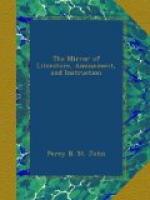We are told that, before she was twelve years of age, she had read most of the standard English poets—a vague term, excluding, no doubt, much that is of real worth, and including more that is worth little or nothing, and yet implying a wholesome course of reading for such a mind. Much history she had also read, both sacred and profane; “the whole of Shakspeare’s, Kotzebue’s, and Goldsmith’s dramatic works;” (oddly consorted names!) “and many of the popular novels and romances of the day:” of the latter, she threw aside at once those which at first sight appeared worthless. This girl is said to have observed every thing: “frequently she has been known to watch the storm, and the retiring clouds, and the rainbow, and the setting sun, for hours.”
An English reader is not prepared to hear of distress arising from straitened circumstances in America—the land of promise, where there is room enough for all, and employment for every body. Yet even in that new country, man, it appears, is born not only to those ills which flesh is heir to, but to those which are entailed upon him by the institutions of society. Lucretia’s mother was confined by illness to her room and bed for many months; and this child, then about twelve years old, instead of profiting under her mother’s care, had in a certain degree to supply her place in the business of the family, and to attend, which she did dutifully and devotedly, to her sick bed. At this time, a gentleman who had heard much of her verses, and expressed a wish to see some of them, was so much gratified on perusing them, that he sent her a complimentary note, enclosing a bank-bill for twenty dollars. The girl’s first joyful thought was that she had now the means, which she had so often longed for, of increasing her little stock of books; but, looking towards the sick bed, tears came in her eyes, and she instantly put the bill into her father’s hands, saying, “Take it, father; it will buy many comforts for mother; I can do without the books.”
There were friends, as they are called, who remonstrated with her parents on the course they were pursuing in her education, and advised that she should be deprived of books, pen, ink, and paper, and rigorously confined to domestic concerns. Her parents loved her both too wisely and too well to be guided by such counsellors, and they anxiously kept the advice secret from Lucretia, lest it should wound her feelings—perhaps, also, lest it should give her, as it properly might, a rooted dislike to these misjudging and unfeeling persons. But she discovered it by accident, and without declaring any such intention, she gave up her pen and her books, and applied herself exclusively to household business, for several months, till her body as well as her spirits failed. She became emaciated, her countenance bore marks of deep dejection, and often, while actively employed in domestic duties, she could neither restrain nor conceal her tears. The mother seems to have been slower in perceiving




